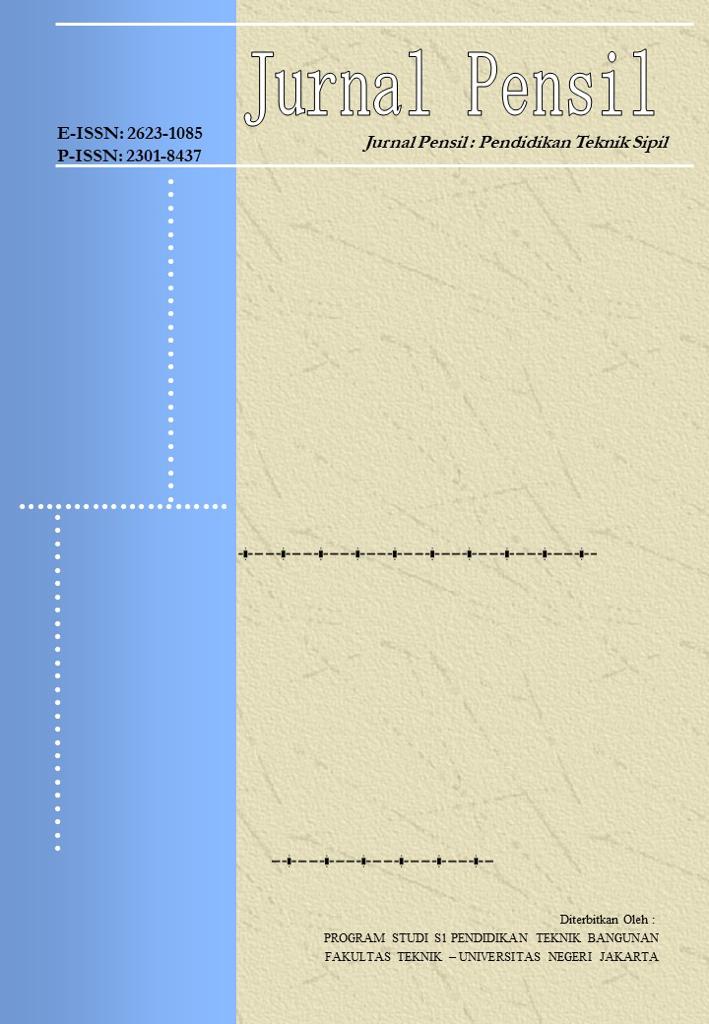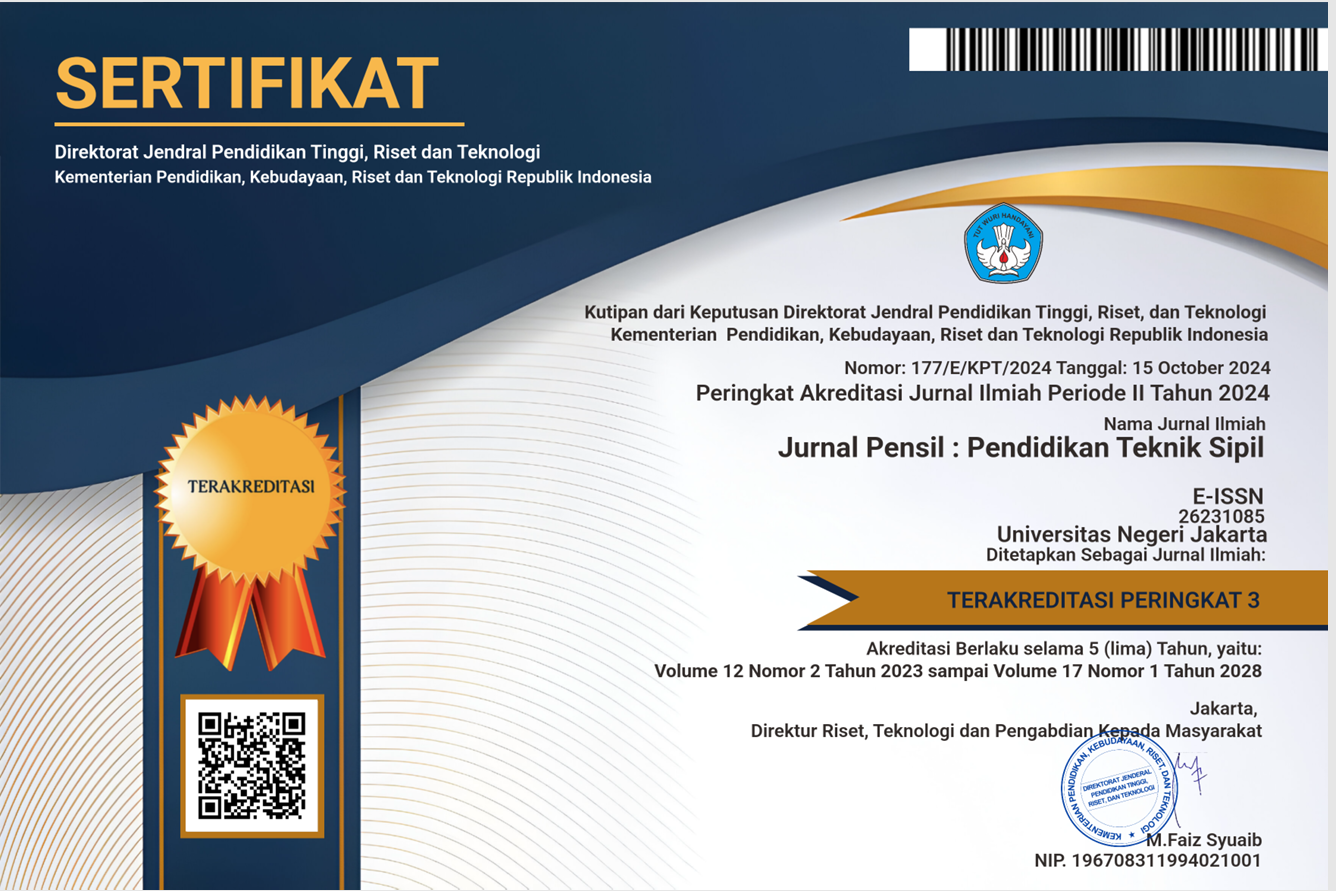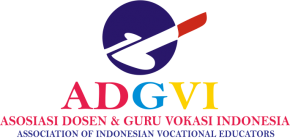THE EFFECTIVENESS OF LEARNING MANAGEMENT APPLICATION IN FOUNDATION ENGINEERING BASED ON E-MODULES IN THE BUILDING ENGINEERING EDUCATION PROGRAM, STATE UNIVERSITY OF JAKARTA
DOI:
https://doi.org/10.21009/jpensil.v14i1.50374Keywords:
Effectiveness, E-Module, Foundation EngineeringAbstract
This study aims to evaluate the effectiveness of e-module-based learning in the Foundation Engineering I course. The research method employed is an experimental approach with two groups. The learning material consists of four learning activities (KB1, KB2, KB3, and KB4). The research instrument includes learning outcome tests conducted before (pre-test) and after (post-test) the learning process. The findings show that the experimental group experienced learning outcome improvements of 29.40% (KB1), 33.94% (KB2), 58.41% (KB3), and 24.51% (KB4). Meanwhile, the control group achieved increases of 25.74% (KB1), 31.67% (KB2), 51.80% (KB3), and 22.44% (KB4). The average learning outcome improvement in the experimental group was 36.49%, slightly higher than the control group at 32.93%, with a difference of 3.56%. However, statistical analysis revealed no significant difference between the two groups. This study indicates that e-modules are not yet fully effective in enhancing learning outcomes in the Foundation Engineering I course. The effectiveness of e-module-based learning is influenced by various factors, such as the e-module design, interactivity, and students’ readiness to utilize technology. Additionally, the complexity of Foundation Engineering I material necessitates intensive guidance from lecturers to support mathematical and conceptual understanding.
References
Abdul Sakti. (2023). Meningkatkan Pembelajaran Melalui Teknologi Digital. Jurnal Penelitian Rumpun Ilmu Teknik, 2(2), 212–219. https://doi.org/10.55606/juprit.v2i2.2025
Asrizal, A., Zan, A. M., Mardian, V., & Festiyed, F. (2022). The Impact of Static Fluid E-Module by Integrating STEM on Learning Outcomes of Students. Journal of Education Technology, 6(1), 110–118. https://doi.org/10.23887/jet.v6i1.42458
Baharuddin, & Hatta. (2024). Transformasi Manajemen Pendidikan: Integrasi Teknologi dan Inovasi dalam Meningkatkan Efektivitas Pembelajaran. Jurnal Review Pendidikan Dan Pengajaran (JRPP), 7(3), 7535–7544. https://doi.org/10.31004/jrpp.v7i3.29703
Çeken, B., & Taşkın, N. (2022). Multimedia learning principles in different learning environments: a systematic review. Smart Learning Environments, 9(1), 19. https://doi.org/10.1186/s40561-022-00200-2
Devega, A. T., Ambiyar, A., Panyahuti, P., Adi, N. H., & Riyanda, A. R. (2022). The effectiveness of learning media on the outcome of computer and basic network of vocational students. Jurnal Pendidikan Teknologi Kejuruan, 5(2), 47–52. https://doi.org/10.24036/jptk.v5i2.23123
Dewi, A., Yany, M., & Hamka, H. (2024). Effectiveness of Using Learning Media to Improve Student Learning Outcomes at SMA Negeri 10 Wajo. JUPE : Jurnal Pendidikan Mandala, 9(3), 816. https://doi.org/10.58258/jupe.v9i3.7457
Dianis Svari, N. M. F., & Arlinayanti, K. D. (2024). Perubahan Paradigma Pendidikan Melalui Pemanfaatan Teknologi di Era Global. Metta : Jurnal Ilmu Multidisiplin, 4(3), 50–63. https://doi.org/10.37329/metta.v4i3.3407
Fianti, D. A. (2021). Efektivitas Penggunaan Modul Sistem Utilitas Bangunan Gedung (SUBG) Untuk Meningkatkan Hasil Belajar Siswa Kelas XI SMK Negeri 2 Depok. Jurnal Pendidikan Teknik Sipil, 3(2), 192–201. https://doi.org/10.21831/jpts.v3i2.45361
Hajar, S. (2024). Penggunaan Media Pembelajaran Berbasis Teknologi Dalam Menumbuhkan Minat Siswa Terhadap Matematika Di Madrasah Aliyah. Jurnal El-Hamra: Kependidikan Dan Kemasyarakatan, 9(3), 292–298. https://doi.org/10.62630/elhamra.v9i3.326
Handoyo, S. S., Septiandini, E., Wukir, D. A., & Pemungkas, B. R. (2024). Development of Foundation Engineering E-Module in Building Engineering Education Study Program, State University of Jakarta. Jurnal Inovasi Vokasional Dan Teknologi, 24(1), 67–74. https://doi.org/10.24036/invotek.v24i1.1172
Hellín, C. J., Calles-Esteban, F., Valledor, A., Gómez, J., Otón-Tortosa, S., & Tayebi, A. (2023). Enhancing Student Motivation and Engagement through a Gamified Learning Environment. Sustainability, 15(19), 14119. https://doi.org/10.3390/su151914119
Hidayat, N., & Suryadi, S. (2023). Improving Student Learning Outcomes Through the Use of Digital Learning Media. Jurnal Visi Ilmu Pendidikan, 15(1), 29. https://doi.org/10.26418/jvip.v15i1.54889
Holisoh, A., Nurhalimah, N., & Hamda, N. (2023). Analysis of the benefits of using e-modules as distance learning media: can it help students improve cognitive and affective aspects of students? Gema Wiralodra, 14(2), 592–597. https://doi.org/10.31943/gw.v14i2.313
Ifenthaler, D., & Yau, J. Y.-K. (2020). Utilising learning analytics to support study success in higher education: a systematic review. Educational Technology Research and Development, 68(4), 1961–1990. https://doi.org/10.1007/s11423-020-09788-z
Irmawan, S., Suharno, & Saputro, H. (2021). Development of instructional materials based on mobile learning media (MLM) and its benefits. Journal of Physics: Conference Series, 1842(1), 012023. https://doi.org/10.1088/1742-6596/1842/1/012023
Islami, H., & Armiati, A. (2020). Efektivitas Penggunaan Modul Pembelajaran Berbasis Kontekstual Pada Bidang Keahlian Bisnis Dan Manajemen Di Sekolah Menengah Kejuruan (SMK): Literature Review. Jurnal Ecogen, 3(4), 498. https://doi.org/10.24036/jmpe.v3i4.10502
Istiqoma, M., Nani Prihatmi, T., & Anjarwati, R. (2023). Modul Elektronik Sebagai Media Pembelajaran Mandiri. Prosiding SENIATI, 7(2), 296–300. https://doi.org/10.36040/seniati.v7i2.8016
Jaenudin, A., Baedhowi, P., & Murwaningsih, T. (2017). The Effectiveness of the E-Module of Economics Learning on Problem-Based Learning used to Improve Students’ Learning Outcomes. Proceedings of the International Conference on Teacher Training and Education 2017 (ICTTE 2017). https://doi.org/10.2991/ictte-17.2017.32
Lastri, Y. (2023). Pengembangan dan Pemanfaatan Bahan Ajar e-Modul Dalam Proses Pembelajaran. Jurnal Citra Pendidikan, 3(3), 1139–1146. https://doi.org/10.38048/jcp.v3i3.1914
Matje, I. (2022). Guidance for Students in The Development of Learning Media to Increase Learning Outcomes. Room of Civil Society Development, 1(1), 60–64. https://doi.org/10.59110/rcsd.v1i1.11
Mayer, R. E. (2021). Multimedia Learning: Principles and Applications. Cambridge University Press.
Mohamed, F. A. E. (2021). The Effectiveness of the Blended Learning in Enhancing EFL Learning and Collaboration. World Journal of English Language, 12(1), 92. https://doi.org/10.5430/wjel.v12n1p92
Pajriah, Saptono, A., & Pratama, A. (2024). Pengembangan E-Modul dalam Meningkatkan Hasil Belajar pada Mata Pelajaran Ekonomi. EKOMA: Jurnal Ekonomi, Manajemen, Akuntansi, 3(5). https://doi.org/10.56799/ekoma.v3i5.3959
Pertiwi, T. P., Pangestu, D. D., Febrian, W. D., Nove, A. H., Megavitry, R., & Imanirubiarko, S. (2024). Strategi Pengembangan Kompetensi Dosen Untuk Menanggapi Tantangan Pendidikan Abad Ke-21. Jurnal Review Pengajaran Dan Pendidikan, 7(1), 2586–2596. https://doi.org/10.31004/jrpp.v7i1.25779
Pritandhari, M., & Wibawa, F. A. (2021). Analisis Pembelajaran Mandiri Berbasis Daring pada Masa Pandemi COVID-19. Jurnal Lentera Pendidikan Pusat Penelitian LPPM UM Metro, 6(1), 31. https://doi.org/10.24127/jlpp.v6i1.1654
Sahronih, S., Purwanto, A., & Sumantri, M. S. (2019). The Effect of Interactive Learning Media on Students’ Science Learning Outcomes. Proceedings of the 2019 7th International Conference on Information and Education Technology, 20–24. https://doi.org/10.1145/3323771.3323797
Salim, A. (2022). Analisis perubahan sistem pelaksanaan pembelajaran daring ke luring pada masa pandemi covid-19 di madrasah aliyah al-muttaqien. EL HAYAH : Jurnal Studi Islam, XII(1), 5840–5861. https://doi.org/10.22515/elha.v12i1.5262
Sarnoto, A. Z. (2023). Peran Teknologi Informasi Dan Komunikasi Dalam Pengelolaan Pendidikan Menengah Pasca Pandemi Covid-19. Munaddhomah: Jurnal Manajemen Pendidikan Islam, 3(3), 319–328. https://doi.org/10.31538/munaddhomah.v3i3.284
Singh, J., Steele, K., & Singh, L. (2021). Combining the Best of Online and Face-to-Face Learning: Hybrid and Blended Learning Approach for COVID-19, Post Vaccine, & Post-Pandemic World. Journal of Educational Technology Systems, 50(2), 140–171. https://doi.org/10.1177/00472395211047865
Siregar, S. D., Panjaitan, B., Girsang, E., & Dabukke, H. (2019). Learning Media Using Discovery Learning Approach to Improve Student Learning Outcomes. Jurnal Pendidikan Fisika, 8(2), 120–125. https://doi.org/10.22611/jpf.v8i2.15195
Sriyanti, I., Almafie, M. R., Marlina, L., & Jauhari, J. (2021). The effect of Using Flipbook-Based E-modules on Student Learning Outcomes. Kasuari: Physics Education Journal (KPEJ), 3(2), 69–75. https://doi.org/10.37891/kpej.v3i2.156
Supuwiningsih, N. N., Riadi, I. M. P. P., & Cahyaningrum, N. P. W. S. (2023). Development e-Modul Geographic Information System Based on Moodle. International Journal of Engineering Technologies and Management Research, 10(8), 8–18. https://doi.org/10.29121/ijetmr.v10.i8.2023.1348
Susanto, E., & Susanta, A. (2022). Efektivitas e-Modul Interaktid Berbasis Pembelajaran Project Ditinjau dari Kemampuan Literasi Matematis dan Kepercayaan Diri Mahasiswa. JURNAL SILOGISME : Kajian Ilmu Matematika Dan Pembelajarannya, 7(1), 1–13. https://doi.org/10.24269/silogisme.v7i1.5181
Suwirno, R., & Usmeldi, U. (2022). Efektivitas E-Modul Pembelajaran Instalasi Tenaga Listrik Berbasis Edutaiment. Jurnal Pendidikan Teknik Elektro, 3(2), 66–72. https://doi.org/10.24036/jpte.v3i2.192
Syafitri, A., & Kurniawati, Y. (2023). Electronic Module (e-Module) as Innovative Learning Media to Increase Knowledge among Nursing Students. Journal of Maternity Care and Reproductive Health, 5(2). https://doi.org/10.36780/jmcrh.v5i2.253
Syefrinando, B., Sukarno, S., Ariawijaya, M., & Nasukha, A. (2022). The Effect of Digital Literacy Capabilities and Self-Regulation on the Student’s Creativity in Online Physics Teaching. Jurnal Pendidikan IPA Indonesia, 11(3), 489–499. https://doi.org/10.15294/jpii.v11i3.31811
Unal, E., & Cakir, H. (2021). The effect of technology-supported collaborative problem solving method on students’ achievement and engagement. Education and Information Technologies, 26(4), 4127–4150. https://doi.org/10.1007/s10639-021-10463-w
Utomo, C. B. (2018). Manajemen Pembelajaran. Unnes Press.
Wirdiyatusyifa, Sunarno, W., & Supriyanto, A. (2022). The Digital Module to Improve Students’ SEP Skills during the COVID-19 Pandemic. Journal of Hunan University Natural Sciences, 49(8), 110–119. https://doi.org/10.55463/issn.1674-2974.49.8.14
Zahranisa, A., Marlina, N., & Zuliani, R. (2023). Kefektivitas Pengunaan Media Pembelajaran dalam Meningkatkan Minat Belajar Kognitif Siswa Sekolah Dasar Kelas III SDN Sindang Panon 2. MASALIQ, 3(5), 775–789. https://doi.org/10.58578/masaliq.v3i5.1367
Downloads
Published
How to Cite
Issue
Section
License
Copyright (c) 2025 Santoso Sri Handoyo, Rezi Berliana Yasinta, Diah Ayu Wukir, Husnaini, Nabila Rizqiani

This work is licensed under a Creative Commons Attribution-ShareAlike 4.0 International License.











.png)
.png)
1.png)

